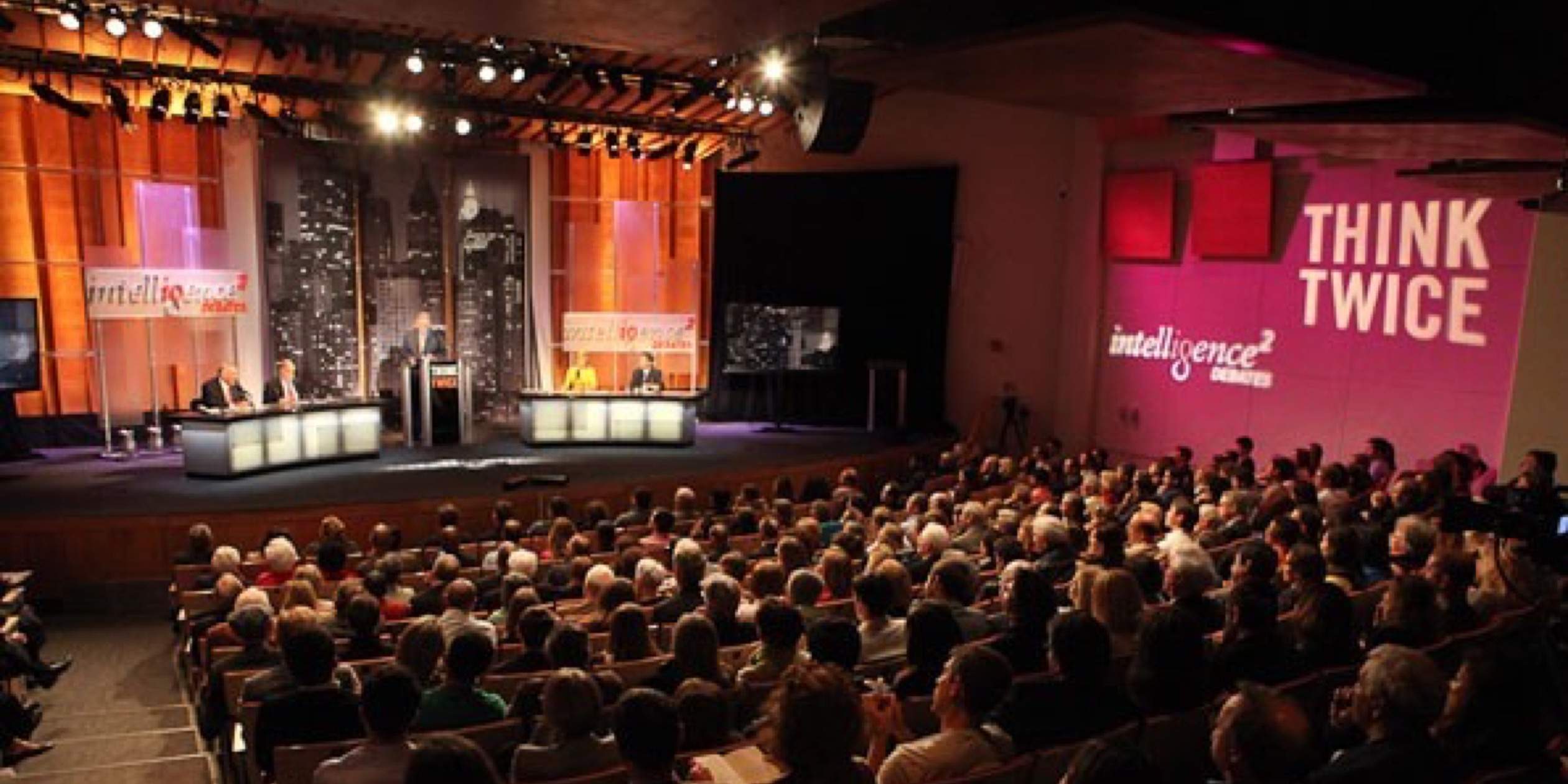The motion last night was "Embrace the Common Core" and I was both pleased and dismayed that this was the only debate that fit into our schedule. I'm already pretty informed about the Common Core and would have enjoyed seeing a debate about a topic that was less familiar to me. On the other hand, the prospect of watching experts in education talk about something so relevant and interesting to me was exciting. Ed and I arrived at the theater (Merkin Hall, which is part of the Kaufman Center) near Lincoln Center and settled into rather small and uncomfortable chairs as ushers tried to fit late-comers into the few remaining seats. It was a sold-out show, and the crowd was a diverse one.
John Donvan, who moderates all of the debates, provided an introduction and explained the procedure and then the panelists took the stage. Arguing for the motion were Carmel Martin and Michael Petrilli. Their opponents were Rick Hess and Carol Burris. I was a bit disappointed that Carol, the visionary principal of a renowned high school in New York state, was the only in-the-trenches educator. Both Michael and Rick work for think tanks and write books and articles about education, and Carmel used the be the assistant Secretary of Education and is now the vice president of the Center for American Progress.
 Before the debate, the audience used small remotes tethered to the arms of our chairs to vote for or against the motion. We were also given the option of going on record as being undecided. (We didn't learn the results until the end of the evening.) Then the debate began.
Before the debate, the audience used small remotes tethered to the arms of our chairs to vote for or against the motion. We were also given the option of going on record as being undecided. (We didn't learn the results until the end of the evening.) Then the debate began.After the opening remarks from each speaker, John Donvan posed questions to each side and allowed panelists to answer them and rebut their opponents' responses. Then the audience was allowed to ask questions. Hands all over the auditorium shot up, but there was only time to address about five questions. Then there were two-minute concluding statements from each panelist and we all voted again. The winning side was determined by calculating which team had changed the most minds.
I really enjoyed the event and had very few criticisms. Although it lasted for two hours I thought the time passed very quickly, as the debaters were good speakers and the topics were engaging. Often, they'd fail to answer the question posed and would drift off on tangents, but John Donvan did an excellent job of smoothly redirecting them. The questions from the audience were generally insightful and relevant. Ed and I were both surprised that the team arguing for the motion didn't seem to be prepared with as much data as was the other side, and we both thought the opposition used some rather cheap tactics at times that seemed to be based more in rhetoric than in actual fact. But overall, I was very impressed with the debate and would love to see another if given the chance. John Donvan agreed with me, apparently; he commended the panelists for a particularly stimulating discussion and the audience for its decorum and good questions. He said that it had been a long time since he hadn't had to throw out any of the questions posed by audience members. Walking into the auditorium earlier that night, I'd wondered whether the experience of attending a debate would be markedly different from listening to one. I concluded that it was certainly much richer to be there but that listening to a podcast was nothing to sneeze at, either.
At the very end of the debate, we learned that the results of the initial vote were as follows: 50% voted to embrace the Common Core, 13% voted not to, and 37% were undecided. After the debate, 67% were in favor of the motion, 27% were against it, and only 6% were undecided. So although it ended up being pretty close, the side arguing for the motion won, having persuaded 17% of people to change their votes compared to the opposition's 14%.
Unfortunately, unless you live in New York of Philadelphia, there aren't opportunities to attend a debate anytime soon. But anybody anywhere can visit the Intelligence Squared website to listen to or watch past debates and cast votes of their own. And John Donvan told us about a recently launched Intelligence Squared app that will provide all of these options from one's smartphone! I can't think of a better way for an intellectual to spice up a commute, road trip, jog, or cooking/cleaning session.

No comments:
Post a Comment